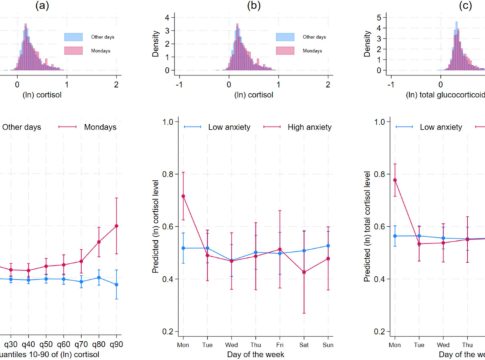Understanding the "Anxious Monday" Effect: A Call for Awareness and Care
It’s not uncommon for many of us to dread Mondays—the return to routine, impending responsibilities, and the end of the weekend’s freedom. However, recent research reveals that this feeling could go beyond mere inconvenience. A study conducted by Professor Tarani Chandola at the University of Hong Kong highlights a potential link between the stresses of Mondays and long-term biological impacts, particularly concerning our heart health.
The Monday Anxiety Phenomenon
In a longitudinal analysis involving over 3,500 older adults, it was discovered that individuals who experience anxiety specifically on Mondays exhibit higher levels of cortisol, a hormone indicative of stress. These elevated cortisol levels can linger for months, suggesting that the beginning of the week may act as a unique trigger for long-term stress responses in our bodies.
-
Cortisol spikes: Those reporting anxiety on Mondays showed cortisol levels that were 23% higher in their hair samples, which reflect two months of cumulative stress.
- Impact on retirees: Interestingly, this “Anxious Monday” effect was not limited to working individuals; retirees also reported heightened stress, indicating that workplace pressures alone do not explain these findings.
The Heart Health Connection
The study draws a compelling connection between Monday-related stress and cardiovascular health. Research indicates that heart attacks are 19% more likely to occur on Mondays, raising questions about the underlying biological mechanisms at play here.
Understanding the HPA Axis
At the heart of this discussion is the hypothalamic-pituitary-adrenal (HPA) axis, a critical system that regulates our stress hormones. When this system is chronically activated, it can lead to various health issues, including:
- Hypertension
- Insulin resistance
- Weakened immune response
The study’s insights suggest that societal norms around the workweek are deeply ingrained in our physiology, adding a layer of complexity to how we manage stress.
Embracing Mindful Transitions
Recognizing the “Anxious Monday” effect is the first step toward managing it. Here are practical strategies to help transform your Mondays from sources of anxiety to opportunities for renewal:
-
Mindful Mornings: Start your day with a calming routine. This could include meditation, light stretching, or a few moments of deep breathing.
-
Plan Ahead: Use the weekend to reflect on the upcoming week. Planning can reduce anxiety and create a sense of control.
-
Connect with Nature: Spend time outdoors, even if it’s just a short walk. Nature can have profound effects on our stress levels.
-
Limit Overcommitment: Consider how many tasks you assign to yourself on Mondays. A light schedule can ease the transition into the workweek.
- Seek Support: If Mondays weigh heavily on you, consider sharing your feelings with friends, family, or a mental health professional.
Final Thoughts
Understanding the “Anxious Monday” effect encourages us to approach the beginning of the week with compassion—both for ourselves and for others. By recognizing that these feelings have biological roots, we can create healthier strategies for coping with stress.
As Professor Chandola aptly notes, Mondays may serve as a cultural stress amplifier. By adopting mindful approaches, we can help mitigate this impact and foster a more balanced, fulfilling start to the week. Together, let’s transform Mondays into manageable, even uplifting days.

Covers wellness, nutrition, mental health, and daily life tips.
Bio: Talia brings a background in health journalism and holistic living to help readers live better, one tip at a time.

